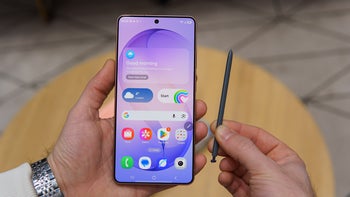2013 WWDC keynote review: Apple gets mean (and desperate?)
This article may contain personal views and opinion from the author.

Apple has had a long history of making backhand digs at Android, and showing plenty of numbers and statistics (of varying degrees of honesty) that show how Apple is the leader in the mobile ecosystem. The numbers have had to change with the rise of Android, but Apple had tended to still not mention Android by name, until today. At the WWDC keynote, Apple started with an attack on Android and didn't let up throughout the rest of the event.
One quick note on this review of the WWDC keynote: we're not going to bother mentioning the amount of hyperbole in the announcement. At this point, we feel like faulting Apple for being hyperbolic with an announcement is like faulting the sun for being hot and bright. It's just the way it is, best to just take it as fact and move on. As we already mentioned, if you remove the hyperbole, iOS 7 is still a solid looking update.
If you look through the history of Apple keynotes over the past few years, there has been an amusing trend in how the company tries to prove its success. At first, Apple loved to tout how many devices were sold, and how much market share iOS held. After a while, it became impossible to spin the numbers in a way to make it sound good, so Apple had to try other techniques, like talking about how consistent the devices were compared to "the competition". Then, Apple kept adding devices and screen sizes to the mix, and could no longer use the dreaded "F-word". Today, Apple tried a few new options, but most were direct attacks where Apple singled out Android by name.
Apple began the keynote with thinly veiled attacks on Android (proper capitalization and punctuation added by us):
If everyone is busy making everything, how can anyone perfect anything? We start to confuse convenience with joy, abundance with choice. Designing something requires focus. The first thing we ask is: what do we want people to feel? Delight, surprise, love, connection. Then, we begin to craft around our intention. It takes time. There are thousands of no's for every yes. We simplify, we perfect, we start over until every thing we touch enhances each life it touches. Only then do we sign our work. Designed by Apple in California.
These were the words that opened WWDC 2013, and there is a lot that is packed into the subtext of those words, and a lot of it doesn't make much sense, so we want to go through it bit by bit.
"If everyone is busy making everything, how can anyone perfect anything?" This seems like a message directly aimed at Android handset makers, but more specifically at Samsung. The message is clear that because Samsung builds so many different devices, none are perfect. While that is true, it doesn't prove the opposite. No device from Apple is perfect, because Apple devices assume a one-size-fits-all policy that simply doesn't work for many users. Many users feel like the iPhone is too small, and iOS to limited as far as customization, and those are valid opinions.
"We start to confuse convenience with joy, abundance with choice." This is still aimed at Android handset makers, but also at Google itself. The idea is that just because something is easy isn't the only thing to consider. If we try to read into it more, we would guess that an example would be widgets: just because it's easier to get information through a widget doesn't mean it's the best way, because you lose some of the experience, and perhaps joy that the app would provide. This argument is really a stretch, because in general, there is no reason to put convenience and joy into the same sphere. While you may get a bit of joy from an animation you see in an app while getting information, that joy diminishes each subsequent time you see it; but, the time saved from convenience never diminishes.
And, on the topic of abundance vs choice, we would simply say that the statement is misleading at best. Sure, abundance can make choice more difficult without easy ways to organize and sort the various options presented, but abundance doesn't eliminate choice, nor does scarcity make for a better choice. This once again falls on the one-size-fits-all idea. A limited choice is only better than abundance if there are options to hit the majority of preferences. We'd say that there need to be 2 more iOS devices - one around 4.7" and one around 6.2" - before this argument can really hit home.
"Designing something requires focus. The first thing we ask is: what do we want people to feel? Delight, surprise, love, connection. Then, we begin to craft around our intention. It takes time. There are thousands of no's for every yes." Again, this likely has some aim at manufacturers, and Samsung in particular, but really we're moving towards the jabs at Google here. The implication is that because Google has so many different products on so many platforms that focus is impossible, although the recent unification of Google product UI is proof enough that isn't true. There is also the implication that Google says "yes" to too many things, which could be true, but is really a matter of choice. For those of us who like to play with beta products, Google is a lovely playground.
This segment of the opening is also an explicit excuse for Apple not moving to a faster release cycle. There are many who wanted to see a new iPhone this month, and probably wanted to see iOS 7 released sooner than the fall, but Apple wants it to be clear that kind of development isn't in the company's DNA... at least until it is.
"We simplify, we perfect, we start over until every thing we touch enhances each life it touches. Only then do we sign our work." We can understand the first part, because Apple has always said that it aims to simplify and perfect (as far as its standards) before releasing a product. The strange part is "start over", because that implies that maybe iOS 7 was going to be something very different, but that idea was scrapped and everything rebooted. This could also be another excuse for the speed of development at Apple. It certainly doesn't apply to Google, because if there is anything that can be said about Android 4.0+ is that it was a full "start over" for the platform.
Fun with statistics
The biggest part of Apple's attack strategy was in the statistics section of the keynote. Given that Apple couldn't go with any metrics involving sales or market share, Tim Cook decided to go with device usage. He showed a number of graphs and charts showing how iOS devices are simply used more than Android devices in terms of overall usage, web share, etc. There was the expected graphs about how much money the App Store makes. Cook even showed a metric about how iOS users were responsible for more shopping during the holidays than other platforms.
Of course, you may see a pattern with these statistics, which is that Apple seems to be very proud to not have low end devices and low income users. Apple would obviously spin it as saying the company is focused on high quality products, but the difference between the two interpretations is slim. This fact also becomes apparent with the statistic regarding customer satisfaction.
Apple's smoking gun metric for the day (and likely to be the same stat we see for a while) is how its customer satisfaction rating compares to the competition. Apple has every right to be proud about it. Apple's mobile devices have incredibly high satisfaction ratings from customers and that's a great thing. Of course, it's much easier to do that when the only "low-end" devices available are simply the previous generation device, rather than a device specifically designed to hit a lower market, which would more likely have glaring issues.
Ultimately, we always have trouble with statistics, because you can basically "prove" anything you want with them. Looking at Apple's statistics, the Mac platform is a far better place than Windows because it has better growth metrics, even though there is far less room for Windows to grow because it already controls about 90% of the market.
Review
Overall, today's keynote was mostly what we expected it to be. Apple spent more time on the Mac side of things that we would have thought, especially since there are still no indications that the company is working towards converging iOS and MacOS. It also seems strange that Apple looks to be setting up to stick with the OS X name, despite the fact that this year's release is 10.9, which would mean it's more likely that next year sees 10.10 rather than version 11.
But, the real message of today's keynote was a solid one: Apple is working really hard on extending battery life of all its products. Apple has tried to be a leader in this area, and has always been careful to show off its work in building better batteries, but this time was all about optimizing the software for better battery life without compromising performance. That's an incredibly compelling feature alone for me, because while I get about 8 hours of life on my Chromebook, my Lenovo laptop can barely crack 2 hours, and while I tend to be rough with mobile devices, my Nexus 4 has only been able to last a day since I was able to offload some of the workload to a Nexus 7. So, it's very interesting to have a laptop with 13 hours of battery life, and whatever crazy number the iPhone 5S is likely to provide (not that I'll spend the money on the hardware, but my wife is in line for a new computer, and she's hooked on Mac).
One thing that was somewhat annoying about the Apple keynote is how much of a contrast it was to Google's keynote to start I/O. Despite the fact that today was supposedly about launching this year's developer conference, the keynote was very consumer oriented. The developer elements of the announcements were almost throw-away portions of the event, which was what we should have expected, but still felt off after Google showed exactly how you can show off new products that appeal to consumers, but still fit into the feel of a developer conference. Granted, Apple is more of a hardware company, and has to make more time for hardware announcements, but the announcement, especially the iOS section was extremely light on new features that developers will be able to take advantage of in the new system.
Conclusion
While Apple showed that it still has the capacity to surprise us, and show something new, both with the iOS 7 reveal as well as the Mac Pro teaser, the company hasn't proven that it can change the way it handles a keynote announcement. There was a fair amount of humor, especially when Craig Federighi was on stage (and really, can he just be the spokesman for Apple from here on out?) But, aside from the humor, this was a far more negative keynote than usual. Veiled jabs at Android and Google are one thing, but the way Apple came out with explicit attacks made the company come off as a bit desperate. As we said at the start, we always expect Apple to come out and use grandiose language to talk up its own products.
Maybe the company thought it would come across like the Mac vs PC ads, but there was no bumbling John Hodgman to be the butt of the joke, Apple was just flat out attacking the competition. And, that never sits well with us. It's the difference between the Samsung ads, which more make fun of Apple fans, and Microsoft ads, which directly come out and call iOS devices useless, and Google crooked. There's a line in there, and today it felt like Apple crossed it a few times.
We really liked what we saw with iOS 7, although we don't expect it to be a game-changer, it should be a great update for users. The Mac side wasn't as impressive, with the notable exception of the Mac Pro. And, overall it felt a bit too mean-spirited, which made Apple's usual hyperbole sound like it was trying too hard to convince us all that everything was okay, when maybe it isn't.
Follow us on Google News














Things that are NOT allowed:
To help keep our community safe and free from spam, we apply temporary limits to newly created accounts: